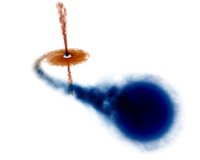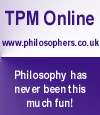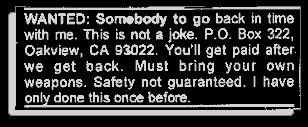Postmodernism and Critical Theory
|
A B C D E F G H I J K L M N O P Q R S T U V W X Y Z
LinksABRoland BarthesRoland Barthes — auf einer finnischen, aber englischsprachigen Books and Writers page. Bio- und Bibliographie.Die strukturalistische Tätigkeit — von Roland Barthes. Jean BaudrillardJean Baudrillard — International Journal of Baudrillard Studies.The Piracy of Art — by Sylvère Lotringer. Zu Jean Baudrillard, International Journal of Baudrillard Studies, Volume 2, Number 2 (July 2005). The Conspiracy of Art – Manifestos, Texts, Interviews, by Jean Baudrillard, The MIT Press, September 2005. "The images from Abu Ghraib are as murderous for America as those of the World Trade Center in flames. The whole West is contained in the burst of sadistic laughter of the American soldiers, as it is behind the construction of the Israeli wall. This is where the truth of these images lies. Truth, but not veracity. As virtual as the war itself, their specific violence adds to the specific violence of the war." CPostmodernism: Rearranging the Furniture of the Universe — by Fayaz Chagani.Jonathan CullerJonathan Culler — Departments of English and Comparative Literature.Semiotics and Deconstruction — by Jonathan Culler, English & Comp. Lit., Cornell Cyberspace, Virtual Reality, and Critical Theory — eine große Linkseite zum Thema. DDefining Postmodernism:
1. premodernism: Original meaning is possessed by authority (for example, the Catholic Church). The individual is dominated by tradition. Deleuze–GuattariDeleuze–Guattari on the Web — a list of links to works about and by Gilles Deleuze & Felix Guattari compiled by Alan Taylor."is an electronic forum for discussion and experimentation rooted in both the separate and joint works of Gilles Deleuze and Felix Guattari. Deleuze–Guattari is an open list—all interested parties are invited and encouraged to participate."The site provides a nice archive: List Papers . A Brief Outline of Anti–Oedipus — by John Protevi . Jacques DerridaWe, the Future of Jacques Derrida — by Eyal Amiran, Postmodern Culture, Volume 15, Number 3, May 2005.Some General Characteristics of Deconstructive Readings: — by Misty G. Anderson: "Opposites are already united; they depend on each other integrally, thus, no presence without absence, etc.Excerpt from Différance — by Jacques Derrida.
"Now the word difference (with an e) can never refer either to differer as temporization or to differends as polemos. Thus the word différance (with an a) is to compensate economically – this loss of meaning, for différance can refer simultaneously to the entire configuration of its meanings. It is immediately and irreducibly polysemic." Excerpt from Signature, Event, Context — by Jacques Derrida. A communication to the Congrès international des Sociétés de philosophie de langue francaise, Montreal, August 1971. From Margins of Philosophy, tr. Alan Bass, pp. 307–330 Différance — no author. Wegen des unmöglichen Hintergrundes sind die Texte der Virtual Library for Critical Theory recht schwierg zu lesen. Bibliography for Différance — Kurzbibliographie von der Virtual Library for Critical Theory. Performative Mourning: Remembering Derrida Through (Re)reading — by Vivian Nun Halloran, Postmodern Culture, Volume 15, Number 3, May 2005. The Politics of Jacques Derrida — a long essay by Mark Lilla which includes a history of French philosophy after WW–II, The New York Review of Books, June 25, 1998, pp. 36-41. Synopsis of Différance — by Professor John Lye (February 6, 1997). Derrida, Hegel, and the Language of Finitude — by Jan Mieszkowski, Postmodern Culture, Volume 15, Number 3, May 2005. A Reader’s Guide to Plato’s Pharmacy und Handout on Plato’s Phaedrus and Plato’s Pharmacy (by Jacques Derrida) — by Tim Spurgin. Ein Seminarplan der Abteilung Contemporary Critical Theory des English Departments des Lawrence University, Appleton, Wisconsin. What’s to Become of "Democracy to Come"? — by Alex Thomson, Postmodern Culture, Volume 15, Number 3, May 2005. EFMichel FoucaultThe Author Function — Excerpt from: Michel Foucault: What is an Author? Trans. Donald F. Bouchard and Sherry Simon. In Language, Counter-Memory, Practice. Ed. Donald F. Bouchard. Ithaca, New York: Cornell University Press, 1977. pp. 124-127.Fusionanomaly — eine grosse Hypertextskulptur, die man sich nicht entgehen lassen sollte. Es wäre müßig, aufzählen zu wollen, was hier alles zu finden ist. Anklicken und erforschen. Highly recommended. GHistory of Structuralism, Volume 1 and History of Structuralism, Volume 2 — das Inhaltsverzeichnis des Buches The History of Structuralism, 2 vols. Trans. Deborah Glassmann. Minneapolis, University of Minnesota P, 1997. Eine historische Übersicht von Themen und Namen.HIJDie Grenze — Marc C. Jägers Homepage mit Aufsätzen zu Michel Foucault, Judith Butler und Jacques Derrida.Fredric JamesonFredric Jameson — Postmodernism or, The Cultural Logic of Late Capitalism, an excerpt from: Postmodernism, or, The Cultural Logic of Late Capitalism, Verso, 1991.Some critical words of Jameson in the intro of his book. "As the word itself suggests, this break is most often related to notions of the waning or extinction of the hundred-year-old modern movement (or to its ideological or aesthetic repudiation). Thus abstract expressionism in painting, existentialism in philosophy, the final forms of representation in the novel, the films of the great auteurs, or the modernist school of poetry (as institutionalised and canonised in the works of Wallace Stevens) all are now seen as the final, extraordinary flowering of a high-modernist impulse which is spent and exhausted with them. The enumeration of what follows, then, at once becomes empirical, chaotic, and heterogeneous: Andy Warhol and pop art, but also photorealism, and beyond it, the “new expressionism”; the moment, in music, of John Cage, but also the synthesis of classical and “popular” styles found in composers like Phil Glass and Terry Riley, and also punk and new wave rock (the Beatles and the Stones now standing as the high-modernist moment of that more recent and rapidly evolving tradition); in film, Godard, post–Godard, and experimental cinema and video, but also a whole new type of commercial film (about which more below); Burroughs, Pynchon, or Ishmael Reed, on the one hand, and the French nouveau roman and its succession, on the other, along with alarming new kinds of literary criticism based on some new aesthetic of textuality or écriture … The list might be extended indefinitely; but does it imply any more fundamental change or break than the periodic style and fashion changes determined by an older high–modernist imperative of stylistic innovation? (…) KFrederick R. KarlAmerican Fictions: The Mega-Novel — © 1985 Frederick R. Karl: on Joseph McElroy’s Women and Men, A Smuggler’s Bible, and Lookout Cartridge, William Gass’s The Tunnel, William Gaddis’s The Recognitions and JR, Thomas Pynchon’s Gravity’s Rainbow and John Barth’s Giles Goat-Boy, Letters and The Sotweed Factor.LJean-François LyotardThe Postmodern Condition. A Report on Knowledge — by Jean-François Lyotard (1979). The Postmodern Condition (1979) publ. Manchester University Press, 1984. The First 5 Chapters of main body of work are reproduced here.MTen ways of Thinking about Deconstruction — Willy Maley, Department of English Literature, University of Glasgow.Realer Than Real — The Simulacrum According to Deleuze and Guattari — by Brian Massumi. Originally published in Copyright no.1, 1987. The Nature and Function of Literary Theories — by J.J.A. Mooij, Institute of General Literary Studies, University of Groningen. NOPPMC — Postmodern Culture – sehr akademisch, aber mit zum Teil hervorragenden Artikeln und Essays.The Po–Mo Page — Postmodern, Postmodernism, Postmodernity — mit einer großen Gegenüberstellung der Kennzeichen von Moderne und Postmoderne. Postmodernism and its Critics — Department of Anthropology College of Arts and Sciences The University of Alabama: Basic Premises, Key Works, Accomplishments, Sources and Bibliography, Points of Reaction, Principal Concepts, Criticisms, Relevant Web Sites, Leading Figures, Methodologies, Comments. Postmodern Fiction Timeline — von 1945 bis 1998. QR
Reconstruction: Studies in Contemporary Culture
—
Understanding the “Analytico-Referential” Lion
— F.E.L. Priestley on Timothy J. Reiss. The Discourse of Modernism,
Ithaca, NY: Cornell UP, 1982.
Richard RortyRichard Rorty — Homepage.Richard Rorty — Internet Links. Martin Ryder: Contemporary Philosophy, Critical Theory and Postmodern Thought — Quellensammlung zu Theodor Adorno, Louis Althusser, Roland Barthes, Michael Bakhtin, Jean Baudrillard, Walter Benjamin, Maurice Blanchot, Kenneth Burke, Jacques Derrida, Gilles Deleuze, Terry Eagleton, Stanley Fish, Michel Foucault, die Frankfurter Schule, Hans–George Gadamer, Anthony Giddens, Antonio Gramsci, Felix Guattari, Jürgen Habermas, Donna Haraway, Martin Heidegger, Agnes Heller, Max Horkheimer, Edmund Husserl, Fredric Jameson, Julia Kristeva, Jacques Lacan, Bruno Latour, Jean Francois Lyotard, Georg Lukács, Paul de Man, Herbert Marcuse, Karl Marx, Maurice Merleau–Ponty, Richard Rorty, Jean–Paul Sartre, Edward Said, Charles Taylor, Paul Virilio und Ludwig Wittgenstein. Die von Martin Ryder von der School of Education an der University of Colorado in Denver betreute Seite ist ziemlich umfassend, was die Links angeht. Absolutely recommended. SThe Ambivalence of our Postmodern Condition. Lyotard’s Diagnosis and Prognosis — by Dr. William Schultz, Associate Professor at the University of Athens, Greece. This article was published in translation in the Greek literary Journal diavazo (September 1998).Semiotics — eine grosse Linkseite zum Thema. Introduction to Modern Literary Theory — by Dr. Kristi Siegel, Mount Mary College, Milwaukee. Eine große und hervorragende Bibliographie und Linksammlung. Fünf Sterne. Susan SontagAgainst Interpretation — by Susan Sontag (16.1.1933—28.12. 2004)."In place of a hermeneutics we need an erotics of art." [1964] Against Postmodernism, etcetera—A Conversation with Susan Sontag — by Evans Chan (late July, 2000). The Truth of Fiction Evokes Our Common Humanity — by Susan Sontag. The essay is excerpted from a speech by Susan Sontag given April 7 2004 at the Los Angeles Public Library upon receiving the library’s annual Literary Award. Theory Tool Box — by Douglas Steward. T
UOutline on Contemporary Literature Since 1945: Postmodernism — by Dr. Linda Tate.VMadonna und postmoderne Identitätskonstruktionen — Die Warenlogik der Unterhaltungsindustrie.
"Ganz generell sind Madonnas Manipulationen auf der Ebene ihrer Persona und ihrer Produkte ein Paradigma der Postmoderne. Im Sinne Leslie Fiedlers (“bridge the gap”) verschmilzt sie dabei verschiedene, noch vor der Postmoderne als antagonistisch oder unvereinbar empfundene Komponenten. Sie durchbricht binäre Oppositionen wie schwarz-weiß, Sex-Religion, Mann-Frau, Gewalt-Liebe, dominante Kultur vs. Gegenkultur etc. und dekonstruiert Antithesen (exemplarisch wurde dies am Beispiel von Videoclips beschrieben, vor allem im Falle von “Like a Prayer”, vgl. Mertin 1998, 98). Spielstrategien sind dabei offen zur Schau gestellte Collage- und Verweistechniken auf der Texterstellungsebene. Auf der Textverarbeitungsebene agiert Madonna mit den postmodernen Gesten der Ironie und Karikatur und den dadurch gebrochenen großen Gesten. Dominant ist bei ihr die Stilfigur des Camp, der aus der homosexuellen Szene Amerikas entwachsenen grandios-vulgären Vereinnahmung und Umkodierung der dominanten Zeichensysteme des Mainstream. Der Camp als “[p]arodistisch überhöhte, bewusst affektierte Inszenierung musikalischer und anderer Posen” (Büttner 1997, 648) vertuscht und feiert zugleich auf schillernde Weise (sexuelle) Transgressionen; er nimmt den dominanten bürgerlichen Kulturproduktionen deren Ernsthaftigkeit (Susan Sontag vermerkte bereits 1964: “The whole point of Camp is to dethrone the serious.” Sontag 1990, 288). Vulgarität wird mit Glamour verbunden, homoerotische Phantasien gehen ihrerseits in den Mainstream ein, der schleichend homosexualisiert wird, wie bei Grace Jones, Freddie Mercury oder George Michael." WWolfgang WelschAesthetics beyond Aesthetics — einer von vielen hochinteressanten Aufsätzen von Wolfgang Welschs Homepage an der Uni Jena.XYThe UC Irvine Critical Theory Resource — “This resource features, for the first time ever in electronic form, a large number of the scholarly bibliographies prepared by Special Collections Bibliographer Eddie Yeghiayan. At present, this resource is divided into two subsections, both of which can be browsed and searched.”Zand last not least:“critical categories are as more or less fishy as they are more or less useful” — meine eigene kleine Seite zum Thema Dekonstruktion, Strukturalismus, Poststrukturalismus und Postmoderne im Rahmen der Pynchon-Seiten. |






